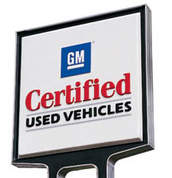Consumers for Auto Reliability and Safety (CARS), the leading consumer advocate organization for car owners in the USA, issued a press release on February 6, entitled, “AUTO SAFETY/CONSUMER ORGANIZATIONS SUE FEDERAL TRADE COMMISSION, OVER DECISION ALLOWING GENERAL MOTORS AND CAR DEALERSHIPS TO ENGAGE IN FALSE ADVERTISING OF UNREPAIRED RECALLED “CERTIFIED USED CARS.”
For many years used cars that were “certified” by car dealers according to rigid standards set by the car’s manufacturer were considered to be the best, most reliable, and safest used cars you can buy. Certified used cars are required by the auto manufacturer to be carefully inspected and tested by the dealer. Only cars that have passed this careful and extensive examination are permitted to be sold as certified. Because of this, certified used cars carry a better warranty and also cost more…about $1,300 on the average.
Sadly, a very bad and puzzling decision by the Federal Trade Decision has changed the rules that define “certified” used cars. The FTC, for reasons known only to them, have issued a ruling that allows car dealers and manufacturers to call a used car “certified” and sell that car to you without any consideration for dangerous recalls. This ruling is not only very wrong, but in direct contradiction of the Federal Trade Commission’s existing rules against selling any product that is dangerous to the consumer.
This would be a terribly dangerous decision at any time, but given the existing huge and historically unprecedented recall of 44 million cars with defective Takata airbags, it poses an immediate, clear and present danger to all buyers of used cars. To quote from CARS press release, “The FTC’s Consent Orders set a de-facto standard for the auto industry that allows dealers to deceptively advertise cars with dangerous and potentially lethal safety defects that have killed and maimed people. May of those defects jeopardize the lives of not only used car buyers, but also passengers and everyone e else who shares the roads and adjacent areas, including sidewalks, driveways and parking lots.” According to Michael Brooks, Acting Director of the Center for Auto Safety, “Even if there is a 100% certainty that an unrepaired safety recall defect will immediately kill anyone who buys a so-called ‘certified’ car and their family, the FTC would allow car dealers to advertise that car (certified car) as ‘safe’ and ‘repaired for safety.’”
The Takata airbag recall affects almost every auto manufacturer in the world. Weekly you see headlines of additional cars being recalled with defective Takata airbags and the pace is so great that millions of these cars have no available fix. Estimates are that it will be years before enough safe replacement airbags will be available to make all these cars safe.
Hopefully this lawsuit against the FTC by Rosemary Shahan’s CARS and the other consumer organizations will prevail, but this can take a long time. Sadly, until the FTC ruling is overturned, it’s Caveat Emptor, BUYER BEWARE, when you buy any used car. The only way you can know that the used car being sold to you does not have defective Takata airbag or other dangerous recall is to check your cars Vehicle Identification Number or VIN. Click on the website for NHTSA, www.SaferCar.gov or www.IsMyCarRecalled.com. You should also call your car’s manufacturer because they have information even more current than NHTSA. Do not rely on the reports by CarFax or AutoCheck because they are often inaccurate.


No comments:
Post a Comment
Earl Stewart On Cars welcomes comments from everyone - supporters and critics alike. We'd like to keep the language and content "PG Rated" so please refrain from vulgarity and inappropriate language. We will delete any comment that violates these guidelines. Oh yeah - one more thing: no commercials! Other than that, comment-away!